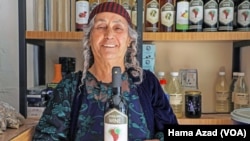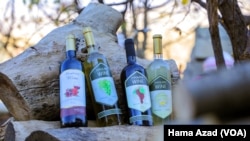The car ride from Erbil, the capital of the Kurdistan region in northern Iraq, to the town of Shaqlawa took about 40 minutes – about the same time it takes to find Fakhria Elia’s home in the mountainous town.
The 76-year-old opened the door with a wide smile on her face and welcomed VOA into her house, with its backyard that overlooks a steep valley, surrounded by the famous Mount Safeen.
“This is where I made my wine for nearly 50 years,” Elia said, pointing to a corner of her backyard where several wooden barrels stood.
Elia is known throughout Kurdistan and Iraq for her homemade wine.
“What makes our wine unique is that the grapes used for it are from our own vineyard,” she told VOA in January. “Everything we make is homegrown.”
The vineyard, located across from Elia’s home, is on a sloping hill.
“I used to produce my wine by placing the grapes on a cloth and crushing them with my feet,” she told VOA. “It was a very difficult, yet fun process.”
When Elia’s children realized she was aging a few years ago, they decided to purchase some modern winemaking equipment so she could carry on her passion.
“On average, the aging time for our wine is seven years.” Elia said as she picked up a sealed bottle of her Shaqlawa wine. “If you want decent wine, then seven years should be enough.”
“Fakhria Elia’s wine is sold in selected liquor stores in Iraqi Kurdistan, January 18, 2023 (Photo: Hama Azad/VOA).”
Elia’s wine is sold in the family’s liquor store, adjacent to the house, as well as selected liquor stores and bars in Erbil and other cities in Iraqi Kurdistan.
Elia belongs to a Christian minority living in a predominately Muslim region. Her hometown, Shaqlawa, used to have a significant Christian population. But now just more than 500 Christians live there, according to a recent census commissioned by the Kurdistan Regional Government.
While the Kurdistan region is largely moderate, alcohol consumption is limited to Christians, other non-Muslims as well as non-practicing Muslims.
In early March, the Iraqi government banned the production, export and import of all alcohol in the country, but that ban doesn’t include the Kurdistan region.
Elia and her family say they have never felt unsafe for running a business that is largely deemed unacceptable by conservative Muslims.
Fazil Khorani, 50, Elia’s youngest son who runs the liquor store, said their business relies on two types of customers.
“Those who come to us specifically for our homemade wine,” he said. “And others who randomly stop by to buy any kind of alcohol.”
With a deteriorating economic situation in the Kurdistan region, Elia hopes to expand her sales beyond Kurdistan and Iraq.
“We get some on-demand business from people in places like Australia, Canada and America, but we certainly want to export our wine in a more formal way,” she said. “It is a product that everyone here should be proud of.”
This story originated in VOA’s Kurdish Service.





